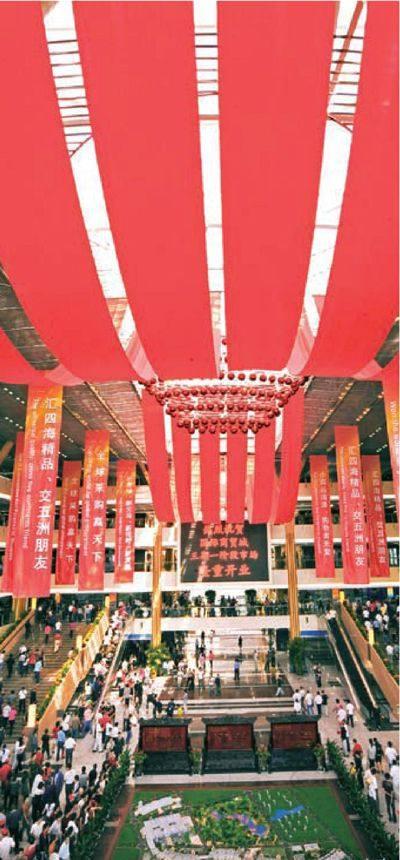浙江义乌:文化靓品热销全球
2012-04-29沈虹
沈虹



中国义乌文化产品交易博览会(简示、交流的载体,积极培育和发展符合称“义乌文博会”)创办于2006年。2008本地特色、顺应市场需求的文化产业,年被评为“中国最具影响力的文化行业形成了以印刷包装、文教体育、框画工品牌展会”。义乌市委、市政府高度重视艺、年画挂历、玩具、娱乐活动六大优势文化建设,结合义乌文博会这个文化展产品为主导的特色产业群,成为中国文
义乌经营户余婕(右一)在向两位南美洲客商介绍一种新款毛绒犀牛玩具。作为中国玩具业重要产销基地的义乌市共有玩具生产和经营企业3200多家,2010年义乌市玩具总销售额约70亿元。
Yu Jie, a sales clerk, shows a new rhino toy to two businessmen from South America.
义乌新光集团饰品设计开发中心设计师白永明在镶嵌一件婚庆头饰。入世10年来,义乌涌现了一批文化产品行业内的全国乃至世界的龙头企业。
This is a gem headgear designed by Yiwu-based Xinguang Group. Since Chinas accession into WTO, a large group of leading enterprises have emerged in Yiwu.
化产品外贸出口重要基地。
背靠国际化小商品市场的独特优势,突出文化产品的交易特性,这是义乌文博会始终保持旺盛生命力的根本原因。每届义乌文博会的外贸成交额都占到了总成交额的60%以上,被誉为“中国文化行业首席国际贸易平台”。“十二五”期间,义乌文博会将坚持以国际化、专业化的发展方向,积极促进我国文化产品出口交易、文化信息交流、产业项目合作和文化产业发展。□
义乌国际商贸城非洲产品展销中心的两位经营户在摆放来自非洲的木雕工艺品。
Two sales clerks arrange sculptures from Africa at African Products Exhibition Hall.
Yiwu: Domestic Trade Powerhouse Goes
International
By Tan Jin Shen Hong
The year 2011 was special for Yiwu, a trade city in central Zhe-jiang. In 2011, the aggregate trade volume of all the marketplaces in the city amounted to 67.785 billion, an increase of 9.13% year-on-year. Of all the marketplaces in Yiwu, China Small Commodities City, the major player of the trade powerhouse, scored a trade vol-ume of 51.512 billion yuan, up 12.95% year-on-year. This makes China Small Commodities City stay on the top of all the specialized wholesale markets in China in terms of annual trade volume for 21st consecutive years since 1991.
The year 2011 was doubly important because the State Council approved a general plan in March 2011 for Yiwu to restructure itself for going international. The trade powerhouse is going to undergo major changes in nine aspects so that it will turn itself into an in-ternational trade center. Yiwu has played a central role in Chinas exporting household commodities for a long time. The new plan is designed to turn the export powerhouse into an international trade center adopting a full range of standard trade rules and practices.
It was in 2011 that the city government launched 15 new policies
CULTURAL INDUSTRY文化产业
玻利维亚客商雨果在义乌国际商贸城一家玩具商铺采购玩具汽车。
Hugo, a business buyer from Bolivia, checks out a toy car at Yiwu International Trade City.
在义乌生活的塞内加尔黑人小兄妹乔丹(右一)、乔美(左二)与父亲(站立者)、母亲(右二)等家人在喝茶聊天。2010年,非洲国家在义乌注册的商务机构办事处有362家,在义乌经商的非洲商人有1000多人。
A Senegalese family sips tea in Yiwu. Nowadays more 1,000 Afri-can business people do business in Yiwu.
in four fields. In May, an import marketplace opened in Yiwu, offering
45,000 commodities in 20 plus categories from 75 countries and re-gions across the world. The new policies aim to modernize and in-ternationalize Yiwu further and turn it into a high-tech trade center.
The first decade of the 21st century witnessed how Yiwu turned itself from a regional trade center into an international marketplace, giving a large number of small and midsize manufacturers in China a platform for international trade. From 2001 to 2010, the interna-tionalization of Yiwu went from less than 5% up to 65% and the trade volume soared from 24.12 billion to 62.116 billion.
Now, more than 400,000 overseas buyers visit Yiwu a year, Yiwu boasts over 3,000 representative agencies of overseas trade enter-prises, and about 13,000 foreign businesspeople live in Yiwu all the year round. These buyers help export more than 1.7 million varie-ties of commodities to 219 countries and regions across the world.
“中国义乌国际小商品博览会”在新建的义乌国际商贸城举行。入世10年来,义乌市场经营面积从100多万平方米增加到470万平方米;经营商位从2万多个增加到7万个。
Since China accession into WTO in December 2001, Yiwu as a trade powerhouse has expanded exponentially. It boasts a business space of 4.7 million m2 and more than 70,000 business shops.
Statistics indicate that more than 200,000 Chinese manufacturers work for the marketplaces in Yiwu and these manufacturers hire a total of more than 10 million employees. □
